How to mock functions for better unit tests
PyTest Mocking
I’ve covered PyTest before in Automatic testing using PyTest, this post will be about mocking objects for PyTests.
What is mocking?

Basically instead of calling the real function or object you create a fake (mocked) object that you can safely manipulate and set various attributes.
Mocking a function
So say for example I want to get how many days ago a date was, let’s make a quick program up to do that
days_since.py
"""PyTest mocking example"""
import datetime
def get_now():
"""Get the datetime object of now"""
now = datetime.datetime.now()
return now
def date(date_in_past: str):
"""Get how many days since DD-MMM-YYYY"""
date_in_past_datetime_object = datetime.datetime.strptime(date_in_past, "%d-%b-%Y")
difference = get_now() - date_in_past_datetime_object
print(f"It's been {difference.days} days since {date_in_past}")
return difference.days
if __name__ == "__main__":
date("02-Jun-2022")
and run it
It's been 62 days since 02-Jun-2022
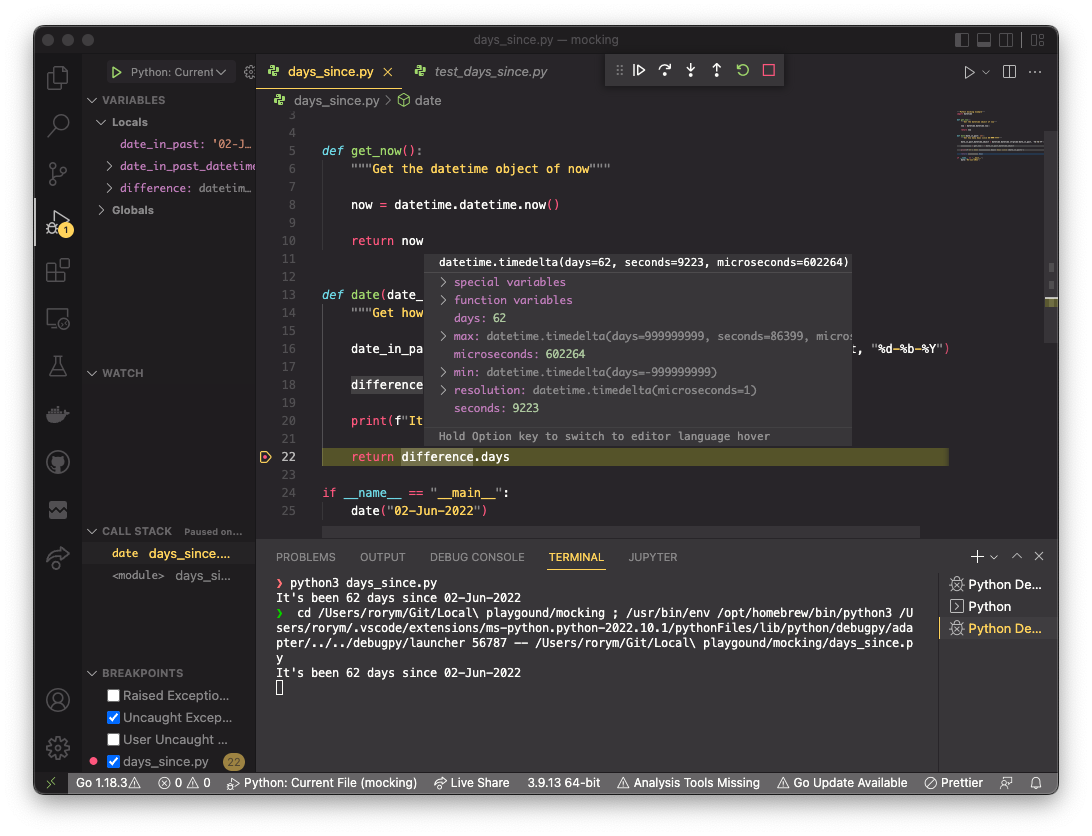
Nice, let’s make some unit tests for this.
test_days_since.py
import days_since
def test_days_since():
assert days_since.date("02-Jun-2022") == 62
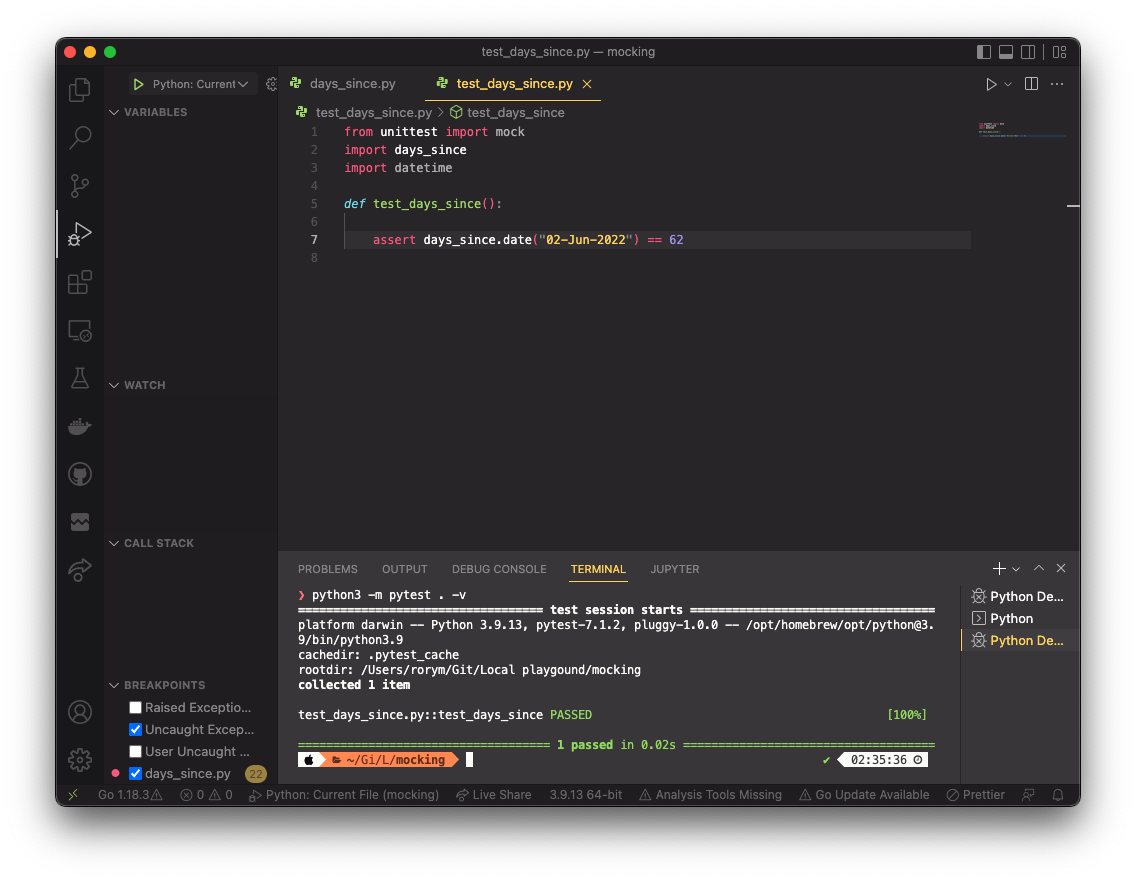
Easy, unit test passes… But what happens tomorrow?
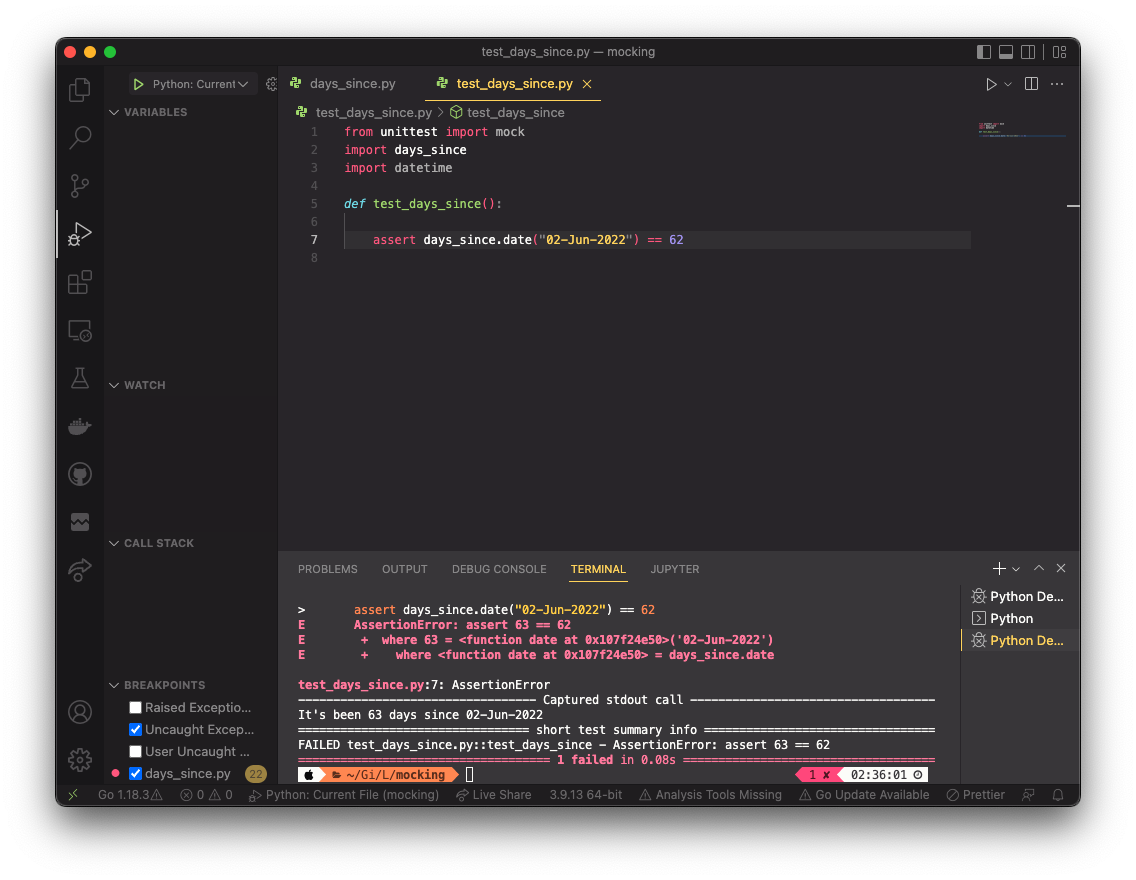
Hmm, because datetime.now() is still actually called the unit test fails. We could do something like assert is_instance(days_since.date("02-Jun-2022"), int) but that’s a pretty weak test.
Instead let’s use something called Mock. Mock allows you to mock functions and objects, you can set a return value for a function. In our case get_now can be mocked to return a specific date. You could mock datetime.datetime but things get a bit funky doing that, so for now we’ll just mock our own function.
test_days_since.py
from unittest import mock
import days_since
import datetime
@mock.patch("days_since.get_now")
def test_days_since(mock_get_now):
mock_get_now.return_value = datetime.datetime(2022, 10, 3, 2, 12, 45, 251322)
assert days_since.date("02-Jun-2022") == 123
So there’s a few things to note here
- We have to import days_since so we can patch it
- You patch it and it’s added as a parameter to your unit test
- We are setting a return value of a
datetimeobject
In this case days_since.get_now will return a date for Oct 3rd 2022 which is 123 days after June 2nd 2022.
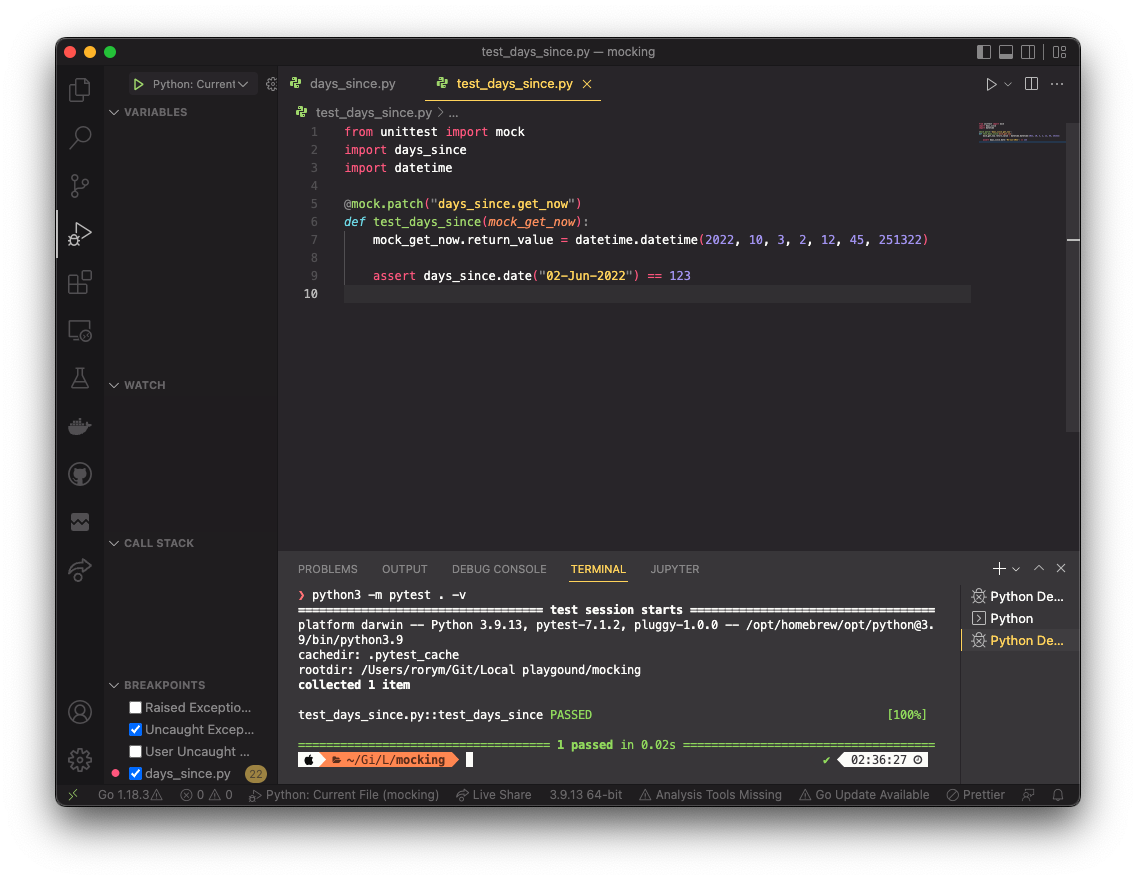
This means that no matter what the date is on the system days_since.get_now() will always return our specified date.
Mocking a HTTP response
We’ve finished our program to get how many days ago a date was, now let’s add in an API call to get the latest notable event from wikipedia on this date.
get_event.py
"""PyTest mocking example"""
import json
import requests
import days_since
def from_today():
"""Get an event of significance on todays date"""
today = days_since.get_now()
url = f"https://byabbe.se/on-this-day/{today.month}/{today.day}/events.json"
response = requests.request("GET", url)
events = json.loads(response.text)["events"]
return events[-1]["description"]
if __name__ == "__main__":
print(from_today())
Again, we get the date from days_since.get_now() make a basic GET request to the API endpoint, and then get the latest event from the returned list.
Looks like NASA’s Phoenix spacecraft launched that day 🚀.
Again, let’s make a unit test for it.
test_get_event.py
import json
import datetime
import get_event
@mock.patch("days_since.get_now")
def test_from_today(mock_get_now, mock_requests):
mock_get_now.return_value = datetime.datetime(2022, 8, 4, 2, 12, 45, 251322)
assert get_event.from_today() == "NASA's Phoenix spacecraft is launched."
Neat, we’ve used the same mocking to make sure the date is always the same - Aug 4th 2022, and we’re checking the event returned is the spacecraft launch.
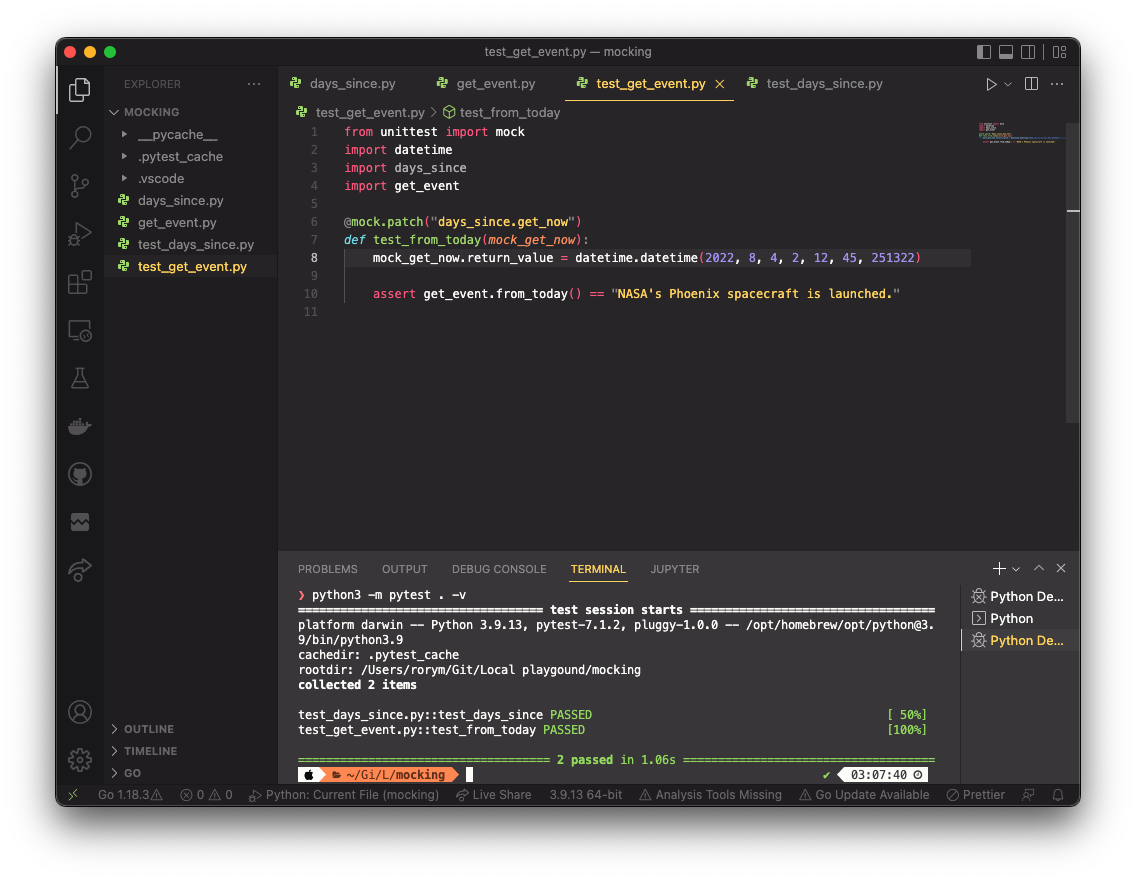
But take a look at how long that took to test. 1.06s that’s a long time, and that’s because our test is still calling the API. This is more of an integration test, but we want a unit test. Why? Well it’s faster and safer, what if our code has a bug and we accidently cause an incident by making some bad API calls?
We want this to be insulated and to be quick.
Let’s mock our HTTP request!
test_get_event.py
import json
import datetime
import get_event
from unittest import mock
@mock.patch("requests.request")
@mock.patch("days_since.get_now")
def test_from_today(mock_get_now, mock_requests):
mock_get_now.return_value = datetime.datetime(2022, 8, 4, 2, 12, 45, 251322)
# Read the example response from a file
with open('event_response.json', 'r') as f:
mocked_response_json = json.load(f)
# Create a mock object to return
mocked_response = mock.Mock()
# Mock the .text attribute as a string
mocked_response.text = json.dumps(mocked_response_json)
# requests.get will return the mocked response object
mock_requests.return_value = mocked_response
assert get_event.from_today() == "NASA's Phoenix spacecraft is launched."
Ok, again, a few things to note
- I’ve downloaded the response from the API and saved it as
event_response.jsonthis is so we can load it as it would be returned to us from the API. I probably should have just read it as a string from a file, but I don’t want to go back and re-do the screenshots so you can look at me parsing thejsonfile only todumpit again. - I’ve created a mock response using the
Mockclass, this is just empty - I’ve then added the
.textattribute and set that to thejsonstring, just likerequests.Response() - I then return that mocked object when
requests.requestis called - The order of the patched objects is the opposite to what you expect
@mock.patch("requests.request")
@mock.patch("days_since.get_now")
def test_from_today(mock_get_now, mock_requests):
Notice how I patch requests first, but it’s the second parameter. Meanwhile days_since is patched second but is the first parameter.
That’s something to watch out for. According to the Docs it’s because
When you nest patch decorators the mocks are passed in to the decorated function in the same order they applied (the normal Python order that decorators are applied). This means from the bottom up, so in the example above the mock for module.ClassName1 is passed in first.
Let’s run our new patched test
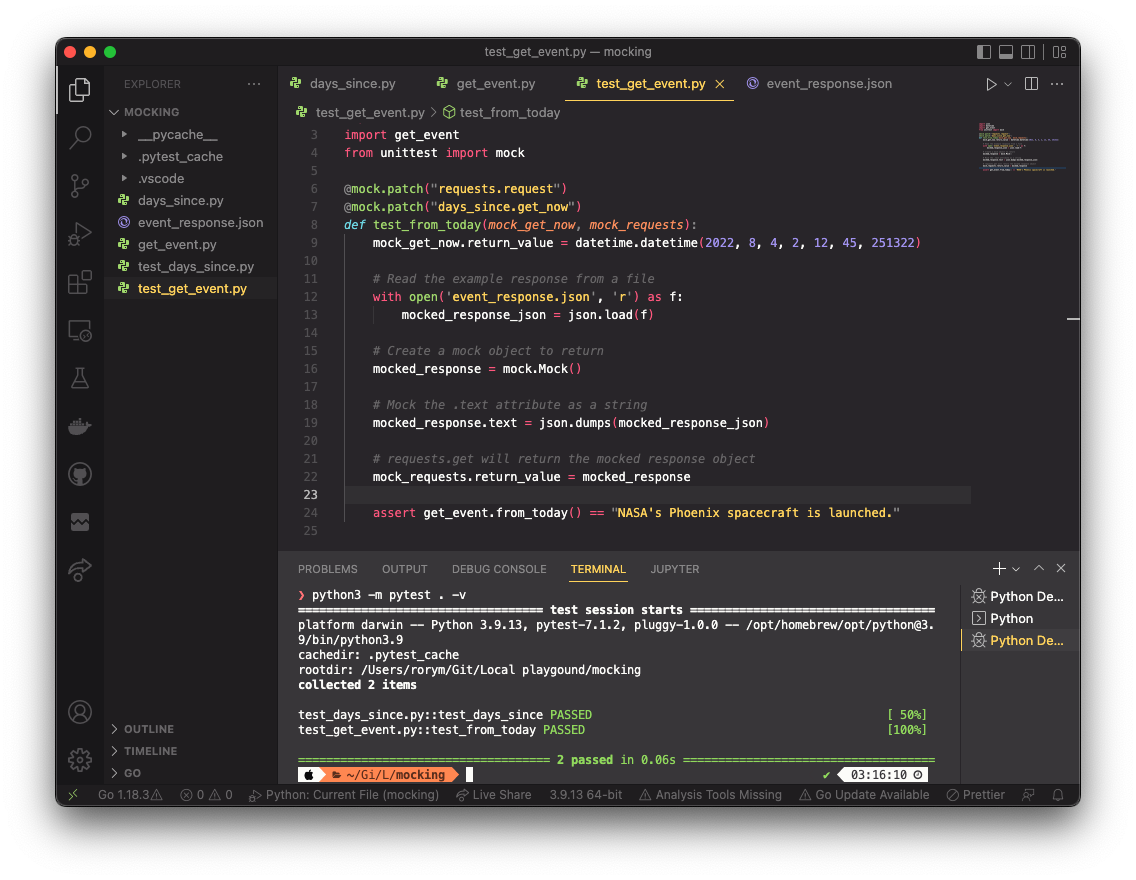
Boom, finished in 0.06s that’s way better, and no actual HTTP calls were made.
So that’s a basic introduction to Mocking, when doing this debugging your tests can save you countless hours, I’d recommend a review of my guide on Python tracing & debugging to help. Particularly pdb.set_trace as you can then run through your tests and see what your mocked objects are returning.
I guess that’s all, bye
